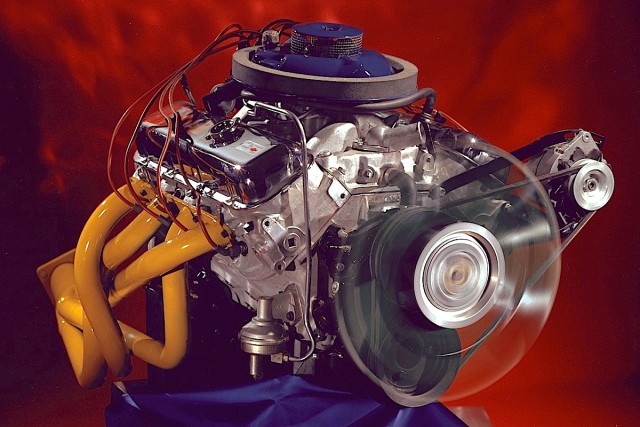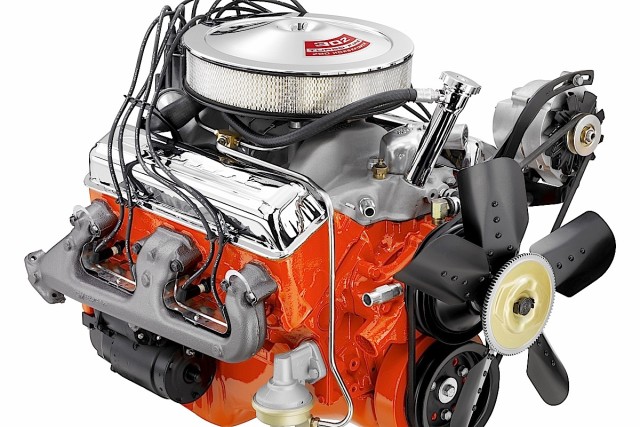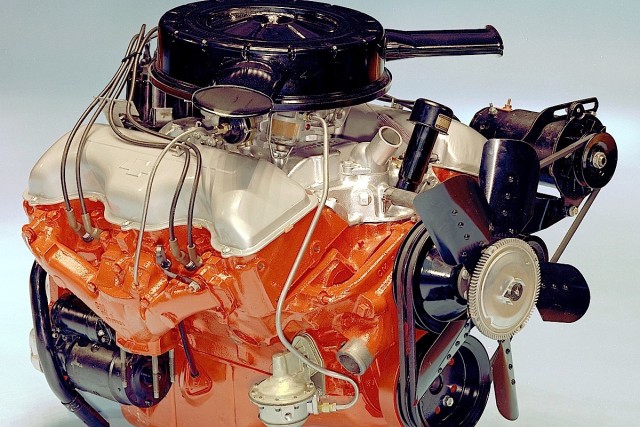As part of the opening celebration for its new Powertrain Performance and Racing Center, GM officials offered a look back at 10 of the greatest Chevrolet race engines ever built for all types of competition. The list covers most popular racing disciplines, including NASCAR, IndyCar, sportscar road racing and drag racing. Here’s the list as defined by GM:
409ci V8
Debuting in the ’61 Chevy and causing an immediate stir with its W-shaped rocker covers, this engine is the forerunner of the famous Chevy big-block family. Drag racers running Stock and Super Stock were immediately drawn to it for the torque and 425-horsepower rating.

The all-aluminum ZL-1 big-block was designed for Can-Am competition and later adapted to the Camaro as part of the COPO program.
427ci “Mystery” engine
NASCAR racer Junior Johnson caused an uproar with a blistering performance at a 1963 Daytona 500 qualifying race, and under the hood was a 427ci engine dubbed the “Mystery V-8.” This engine included design elements that would also evolve into the big-block family. Officials named the Mark II, there were big plans for the engine but GM were soon ordered out of organized racing, which limited its potential.
302ci small-block
Chevy’s new Camaro was a perfect fit for SCCA’s Trans-Am road racing series that was fast growing in popularity by the late ’60s. Problem was, Chevy didn’t have a suitable production engine in the lineup that met the series’ displacement limit. Leveraging the wide range of small-block choices, engineers used the 4.00-inch bores of the 327 engine with the same 3.00-inch stroke of a 283 engine to arrive at 302 cubic inches. To homologate it for series eligibility, Chevrolet installed it in a special Camaro model ordered with the option code Z28 – and a legend was born.
427 ZL1 big-block
Originally developed for the Can-Am racing series, the all-aluminum 427ci ZL1 engine was pushed into a second life under the COPO program. An enterprising Chevrolet dealer named Fred Gibb used Chevy’s special ordering system known to build 50 1969 Camaro models with the tricked-out Rat motor. Other dealers followed for a total of 69 ZL1-powered Camaros.
SB2 NASCAR engine
This is the first time Chevrolet developed an engine package exclusively for NASCAR racing. The SB2 debuted in 1998 and was based on the classic small-block architecture but used unique cylinder heads with a specific valve arrangement. Jeff Gordon drove an SB2-powered Chevrolet Monte Carlo to the series championship that year.
The SB2, left, and R07 small-blocks were designed specifically for NASCAR competition.
R07 NASCAR engine
Building off the success of the SB2 engine program, Chevrolet introduced the totally unique R07 racing engine in 2007. Using state-of-the-art computational fluid dynamics to optimize high-rpm airflow, the R07 was designed strictly for NASCAR racing and shared nothing with previous engine designs. Its “mirror port” cylinder heads, however, are similar to those used in GM’s LS-family engines. The engine continues to power NASCAR Sprint Cup racers, who recorded 15 wins in 2015 and claimed a record 13th consecutive manufacturer title.
7.0L Corvette C6.R
The Corvette Racing C6.R notched 39 wins in the GT1 class, and won championships from 2005-2008. All those wins were backed by a production-based 7.0L (427 cubic inches) racing engine. With deep-breathing cylinder heads leveraging a long legacy of small-block development, the 7.0L engine proved powerful and durable.

Technology developed by GM Racing for the Corvette race car’s 7-liter small-block V-8 was incorporated in the 500-horsepower LS7 The 7-liter racing and production engines both feature dry-sump lubrication systems, CNC-ported cylinder heads, titanium valves and connecting rods, forged-steel crankshafts and plate-honed cylinder bores.
Chevrolet/Ilmor 2.65L Turbo V8
A special chapter in Chevrolet’s racing legacy started with the 1986 CART Champ Car series, when–at the behest of Roger Penske–the brand partnered with England’s Ilmor Engineering on a 2.65L turbo V8 engine. Its domination through 1992 was unequivocal, capturing 64 of 78 races, including six consecutive Indianapolis 500 wins.
Chevrolet/Ilmor 2.2L twin-turbo V6
Chevrolet returned to IndyCar racing in 2012–again partnering with Ilmor–to introduced an all-new 2.2L twin-turbo V6. The direct-injected engine produces approximately 700 horsepower and powered Chevrolet drivers to 10 wins out of 16 races in 2015 – including Juan Pablo Montoya’s Indy 500 win.
1.6L turbocharged I4
Thanks to a durable 1.6L turbo engine, the Chevy Cruze has become a powerful force in the World Touring Car Championship (WTCC) series, chalking up more wins than any other manufacturer and four consecutive driver championships. The 1.6L turbo is based on a production engine used in Cruze models in many global markets.






















